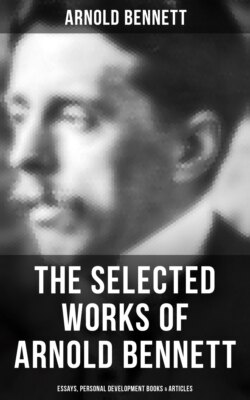Читать книгу The Selected Works of Arnold Bennett: Essays, Personal Development Books & Articles - Arnold Bennett - Страница 56
На сайте Литреса книга снята с продажи.
What Fiction is.
ОглавлениеThe art of fiction is the art of telling a story. This statement is not so obvious and unnecessary as it may seem. Most beginners and many “practised hands” attend to all kinds of things before they attend to the story. With them the art of fiction is the art of describing character or landscape, of getting “atmosphere,” and of being humorous, pathetic, flippant, or terrifying; while the story is a perfunctory excuse for these feats. They are so busy with the traditional paraphernalia of fiction, with the tricks of the craft, that what should be their principal business is reduced to a subsidiary task. They forget that “character,” landscape, “atmosphere,” humour, pathos, &c., are not ends in themselves, but only means towards an end.
The art of fiction is not the art of making an otherwise uninteresting story interesting by dint of literary skill and theatrical devices. It is the art of telling an intrinsically interesting story. The story itself—that is to say, the naked events or chain of events to be narrated—must be interesting. Imagine that you meet a friend after an absence during which something extraordinary has happened to you or to some one whom you know. You are brimming over with a choice bit of gossip. You cannot keep it to yourself. You break in: “Oh, I must tell you this!” And you begin. Perhaps the affair concerns people with whom your friend is unacquainted, and therefore certain explanations are necessary in order that he may grasp the full beauty of the situation. You are impatient because you cannot come to the point at once. “I must just explain first,” you say, and you compress all preliminaries into the smallest possible space, but omitting nothing essential. And your friend says: “Yes”—“Yes”— “Yes,” growing more and more interested. His interest is kindled by yours. You never bother your head about atmosphere, landscape, character-drawing; yet all the time you are achieving these things unconsciously, in so far as they are necessary to the appreciation of your choice bit of gossip. At length you come to the central facts of the situation. You are preoccupied with them, not with the devices of narrative. The situation is so interesting that it wants no ornament, and what humour or pathos or wit comes out of it, emerges naturally and inevitably, because it must emerge. You arrive at the end. “Now isn’t that interesting?” you ask your friend with confidence. “Rather!” he exclaims. And you breathe with relief.
Now that is precisely the spirit in which fiction should be written. The writer himself should be tremendously absorbed in the story; which is equivalent to saying that the naked events, the plot, should be interesting. Part of the secret of Balzac’s unique power over the reader is the unique intensity of his own interest in the thing to be told. This singular interest gives animation to the extraordinarily long descriptions and explanations which Balzac constantly employed. You can almost hear him saying to you as he pants heavily through these preliminary pages: “Wait a minute, wait a minute. It’s absolutely necessary that I should make this clear, otherwise you wouldn’t quite grasp the point . . . I’m coming to the story as fast as I can.”
Plot, therefore, is the primary thing in fiction. Only a very clever craftsman can manipulate a feeble plot so as to make it even passably interesting. Whereas the clumsiest bungler in narration cannot altogether spoil a really sound plot Hence the beginner has special need of a sound plot Some years ago there was a movement against the supremacy of plot, or subject, in art The cry was—“Subject is nothing; treatment is everything.” The general public, following for once a classical ideal of taste, would not tolerate this theory, which has now died a natural death. I will quote from an illuminative essay of Matthew Arnold’s, slightly altering the phraseology to suit the case. He says: “It is a pity that power should be wasted, and that the novelist should be compelled to impart interest and force to his subject, instead of receiving them from it, and thereby doubling his impressiveness.” I italicise this epigrammatic statement, because it is of paramount importance, and goes to the very root of fiction as of every other creative art. Matthew Arnold, who got his ideas from the Greeks, enumerated three principles as being vital to good art:—
(1) The all-importance of the choice of a subject
(2) The necessity of accurate construction.
(3) The subordinate character of expression.
And the curious thing is that these three principles are vital not only to good art but to commercial or popular art. It will be equally to your advantage to conform to them, whether your aim is to produce a rival to Adam Bede or to thrill the readers of a halfpenny paper with a sensational serial.
